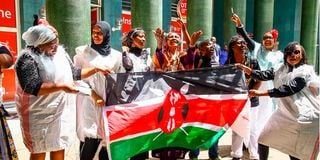
A group of women participate in a prayer vigil on Kimathi Street, Nairobi on January 6, 2025 calling for the release of individuals who were reportedly abducted by individuals believed to be police officers.
On February 28, 1992, women and mothers of the Release Political Prisoners (RPP) Pressure Group presented a petition to then Attorney General Amos Wako after a year's hunger strike in Freedom Corner and All Saints Cathedral in Nairobi. They were demanding the release of their sons.
The parallels were not lost to me when on January 6, 2025 a march was called invoking the spirit of mothers and women. Their unwavering determination was a powerful call for justice and the release of their sons. The significance of women’s involvement in these protests cannot be overstated.
Women’s historical involvement in protests shines a powerful light on their essential role as frontliners, and champions of social change. From the fearless suffragists of the early 20th century, who bravely employed picketing and civil disobedience to secure the right to vote, the devoted mothers advocating for peace and education, women have consistently risen to confront injustice with unwavering courage and resilience, and Argentinian and Chilean women who protested for years against authoritarian regimes with state-sponsored abductions of detractors and critics.
Women’s activism
Then in India, the Chipko environmental activists who bound themselves to trees, to protect them from government commercial logging - a movement that became globally seen as an example of the impact of deforestation on indigenous and local communities and how to fight back.
Their activism not only amplifies marginalized voices but also ignites a collective spirit that drives transformative societal reforms. As we fast forward to January 6, 2025, when a call was made to join mothers in protesting abductions and forced disappearances, it rekindled the courageous spirit of these heroic women, reminding us that the fight for freedom and dignity is far from over and that women’s activism remains a vital force that shapes a just society and paves the way for future generations.
Women have always been at the forefront of movements in Kenya, especially when hope seems lost. At the time of writing this article, five young men who had been abducted in earlier weeks were found alive, a testament to the power of collective action. When mothers speak, the nation must listen — just as they did in 1992.
This power of women’s engagement cannot be underestimated. Women have historically harnessed their strength and communal bonds to advocate for justice and peace. Their passion and resolve serve as a beacon of hope, inspiring not only their families but entire communities to rise against oppression. As we reflect on this legacy, we recognise that women’s activism is not just about addressing immediate issues, it is a profound expression of resilience and faith that fuels societal transformation. Together, we honour their spirit and commitment, knowing that when women unite, they wield an unparalleled force for change.
Powerful call for justice
In Kenya, we have a strong Constitution with clear roles for the three arms of government. The past few months have seen the critical role of the Judiciary, stepping up and protecting our rights and those of our children. What then do we make of the fact that mothers are now forced to go out in the streets to advocate for the release of their children? What does it say about the state of our country? These mothers’ deepest fear is that their missing sons and daughters will never return. As a country we pray for their safe return.
I have always found profound inspiration in the words of our national anthem, which resonates with a powerful call for justice: “Oh God of all creation, bless this our land and nation. Justice be our shield and defender…” This anthem serves as a reminder of our collective responsibility to uphold the rule of law, a commitment that the Judiciary demonstrated by directing Inspector General of Police Douglas Kanja to account for those abducted.
The rule of law is a legal framework and the cornerstone of our economic development. Without it, investors hesitate to engage, fearing for their safety and the stability of their ventures. The ongoing abductions and the uncertainty faced by families of the disappeared threaten our potential for growth. History has shown that Kenya’s periods of repression correlate with stagnation; when institutions falter, so too does progress.
Let us unite in gratitude for the judiciary’s efforts and recognize that when we stand firm for justice, we not only honour the legacy of those who came before us but also pave the way for a brighter future. Together, we can ensure that justice prevails, fostering an environment where prosperity flourishes and every Kenyan can thrive.
Wanjira Mathai is the MD for Africa & Global Partnerships at the World Resources Institute and Chair of the Wangari Maathai Foundation










